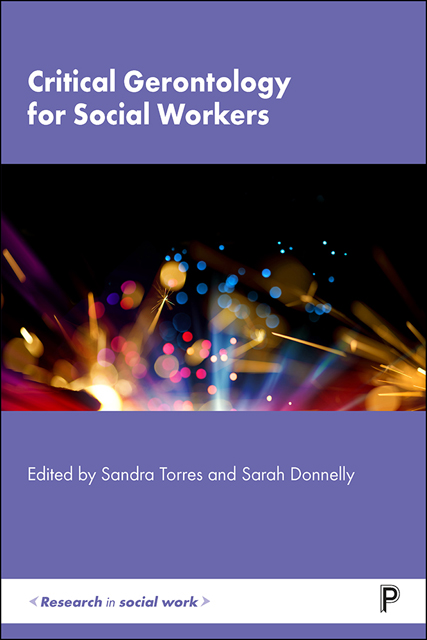Book contents
- Frontmatter
- Contents
- List of figures and tables
- Notes on contributors
- Acknowledgements
- Preface
- 1 Social work and critical gerontology: why the former needs the latter
- Part I Critical gerontology as guiding principles for social work with older people
- Part II Applying the critical gerontological lens to social work research, policy and practice
- Index
4 - Agency and autonomy
Published online by Cambridge University Press: 13 October 2022
- Frontmatter
- Contents
- List of figures and tables
- Notes on contributors
- Acknowledgements
- Preface
- 1 Social work and critical gerontology: why the former needs the latter
- Part I Critical gerontology as guiding principles for social work with older people
- Part II Applying the critical gerontological lens to social work research, policy and practice
- Index
Summary
The framing of old age has long been regarded as being relatively unproblematic, given that old age and decline appear inextricably linked. This connection helps to explain why concerns of the latter part of the lifecourse are regarded as the province of health and social policy. Old age was a period marked out by ‘agedness’, something constituted by both physical need and social dependency (Pickard, 2013). Even the most noticeable marker of old age, the state retirement pension, was a product of the widespread recognition that older workers (in the first instance men) needed a substitute income to compensate them for their inability to work, given the physical limitations accompanying ageing (Scheubel, 2013). Similarly, the health problems of the older population were assumed to be intractable chronic conditions that led to institutionalisation of one kind or another (Trattner, 2007; Levene, 2009). The modern welfare state categorically saw older people as a residualised group incapacitated by their social dependency and individual passivity (Carey, 2016).
By the end of the 20th century, this projection of old age was considerably changed. Not only was the reaching of retirement age now an almost universal experience, but high-income nations were now experiencing increased life expectancy as well as increased disability-free life expectancy; the conjunction of both transformed expectations and experiences of later life. While not entirely free from the older narratives of old age, such developments led to discussions of old age as being a potential ‘crown of life’ rather than ‘a tragedy’ (Townsend, 1963). Issues of personal agency became more important in later life as the once clear-cut demarcations of old age provided by social policy became less easy to maintain. Older people were, in the main, more similar to those who were younger than them, and the cultural distinctions between the working and retired population became more difficult to ascertain (Jones et al, 2008). The period of post-working life seemed to extend and become much more of a lifestyle than being solely an ascribed status.
While old age was still understood in terms of welfare policies, the societies in which older people now lived had become different from the ones that had existed at the dawn of the welfare state in the 1950s.
- Type
- Chapter
- Information
- Critical Gerontology for Social Workers , pp. 51 - 65Publisher: Bristol University PressPrint publication year: 2022



